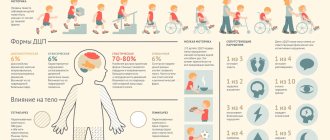Science has long proven that depression is not just sadness that overcomes a person for a long time, but a disease that needs treatment. One of the varieties of this mental disorder is pregnancy depression. If it is not diagnosed in time, it can develop into a more serious disease - prenatal psychosis. What are the causes of depression in women in an “interesting” situation? What methods of treatment exist today?
Features of the mental state of a pregnant woman
If the pregnancy is planned and the woman has a warm, trusting relationship with the father of the child, then she does not experience any special stress. But hormonal changes still affect the psyche, and a woman can’t do anything about it. Therefore, it is advisable for both the husband and work colleagues to treat the woman’s condition with understanding and allow her to “let off steam.” And soon, with the onset of the 2nd trimester, this should pass.
However, severe sadness and a constantly gloomy and depressed state in the first trimester are not a normal manifestation of hormonal surges. Depression and psychosis are not normal behavior during this period. Most likely, there are other reasons here that definitely need to be dealt with. And if a woman has been feeling depressed for a long time, it is better to consult a psychologist.
Is depression a dangerous condition?
The depressed state of the mother negatively affects the development of the fetus. Research conducted by scientists has proven the connection between the mood of a pregnant woman and the formation of a child. Children whose mothers were depressed during pregnancy experience depression during fetal development and remain depressed after birth. Subsequently, such children often experience developmental delays, mental disorders and weak immunity.
Severe depression during pregnancy can disrupt the placental blood supply. In this case, the child does not receive the required amount of nutrients and oxygen, which are vital for his normal development. This can cause delays or abnormalities in its development, even death.
The pregnancy of an oppressed woman can be terminated prematurely and end in miscarriage. In the third trimester, the risk of having a premature baby increases.
An unsatisfied emotional state can provoke early discharge of amniotic fluid, which is dangerous for the fetus.
Decadent moods weaken the labor activity of a woman in labor. Her labor may be long and difficult. Complicated childbirth poses a threat to the health of both mother and child.
Thus, the very depressed state of a pregnant woman is more dangerous for her child than her fears.
Causes of depression in pregnant women
The depressed and apathetic state of a woman who is carrying a child is a pretty bad indicator. Stress is one thing, but it’s easier to deal with. But depressive disorder is treated primarily with medications. And any chemical medications are contraindicated for the fetus.
What leads to this condition?
- Constantly pushing yourself.
- Excessive stress at work, leading to chronic fatigue and dissatisfaction with life.
- Unplanned and unwanted pregnancy.
- Risks of pathology in a child.
- Material insecurity.
- Quarrels with husband or his relatives.
- Fears of being a bad mother.
- Disturbed hormonal levels due to problems in the functioning of the main hormonal “base” - the thyroid gland.
- Genetic predisposition.
- Death of a relative or close friend.
There's no point in thinking about what hasn't happened yet. This is exactly what psychologists say at the reception. There is no need to worry and reach a nervous breakdown, fearing for the physical or mental disabilities of the unborn child. After all, if there are significant medical reasons leading to fetal defects, then the gynecologist would tell you about it.
When the birth of a child is planned, not only the physiological state of the expectant mother is important, but also her psychological health. If a girl has always been somewhat suspicious, overly cautious and inclined to exaggerate the difficulties of life, then it is necessary to undergo a course of psychotherapy and learn to cope with the influx of depressive thoughts.
How to recognize the condition
Depression in pregnant women is a fairly common pathological condition in the modern world, which is primarily due to the excessively stressful situation that has developed in society at the present time. In this regard, it is necessary to have a rough understanding of what symptoms it is accompanied by.
Below we provide a list of the most common symptoms of depressive disorders:
- Disruption of sleep-wake cycles (a woman may sleep all day long, may not sleep at all, or may suffer from constant nightmares and often wake up at night).
- Loss of interest in the fate of loved ones, one’s own condition and loss of all interest in any processes happening around.
- Decreased or complete absence of appetite.
- Decreased or complete absence of sexual desire.
- The emergence of suicidal thoughts and tendencies.
- Stably depressed mood, up to bouts of constant crying or complete apathy.
- A pathological decrease in volitional processes is the inability to force oneself to get out of bed, get dressed, wash, prepare food for oneself, etc.
- Impaired speech activity - the voice becomes quiet, speech becomes sluggish and unintelligible, women answer questions posed with a delay, and sometimes even ignore them altogether.
- Dilation or, on the contrary, narrowing of the pupil to non-physiological sizes.
- Optical photophobia, reluctance to be in sunlight or any other source of light.
- Pathological changes in the gastrointestinal tract, usually constipation, but sometimes it is also possible to develop heartburn, diarrhea and abdominal pain.
How to identify depression?
As a disease based on a lack of certain neurotransmitters in the brain, depression has clearly defined characteristics. Let's list them:
- loss of appetite;
- a person constantly feels tired;
- exaggerated sense of worthlessness;
- irritability;
- reluctance to talk to anyone;
- alienation from loved ones;
- apathy, no interest in anything;
- the world around us loses its color for a person.
With her attitudes, a woman seems to drive herself into this dark corner. And if you don’t work with your thoughts, the situation will continue to get worse. A negatively-minded woman can even lose her child. It is necessary to include reflection - to be aware of your attitudes and change them to the opposite.
First and second trimesters
According to statistics, women are more likely to suffer from depression. They are more suspicious, susceptible to emotions and have a hard time with quarrels with loved ones. Hormonal changes and various fears trigger a mechanism of depression, the woman feels that she cannot cope with anything, her stomach has made her ugly, and her husband may already be looking for someone else. Such thoughts have a terrible effect on a woman.
Relatives and friends should support you at this time, involve you in some kind of activity, and interest you in new books and films.
What are the dangers of depression during pregnancy? The first trimester is dangerous because even many herbs known as sedatives are contraindicated, as they can cause miscarriage. Baths with aromatic oils, used in cases of neuroses and depression, are also prohibited. A woman will have to rely solely on psychotherapy and self-hypnosis.
In cases where there are risks of an unfavorable pregnancy outcome, there is also no need to despair. We must hope for the best. After all, probability is not a fait accompli.
Depression during pregnancy also develops due to disagreements with the husband, or even more so if the man refused to raise his child. Then the woman needs to start a course of psychotherapy as soon as possible and restore activity and good spirits. After all, it will be twice as difficult for her.
What symptoms should alert you?
Pregnancy and depression can occur in different ways. One category of expectant mothers is excessively tearful, they suffer from insomnia, they are constantly afraid of something, which as a result causes the appearance of suicidal tendencies. At the same time, the pathological syndrome is accompanied by a number of symptoms, in the presence of which the syndrome can be diagnosed.
Depression during pregnancy is manifested by the following symptoms:
- Excessive irritability.
- Sense of anxiety.
- Lack of concentration.
- Poor or increased appetite.
- Fatigue, weakness, bad mood.
- Fear of walking.
- Increased suspiciousness, feeling of guilt before others.
- Daytime sleepiness.
- Low self-esteem, feeling of joylessness, hopelessness.
- Closedness, feeling of uncertainty.
- Tearfulness, constant hysterics.
At the first symptoms of prenatal depression, a woman should tell close people about her problem. This condition cannot go away on its own, but it is possible to cope with it if you approach the solution of the problem with full responsibility.
The husband and relatives should surround a woman who is in an “interesting position” with care and attention. It is necessary to analyze what reasons could cause such a condition, and they should be eliminated. Regarding the “blues,” simple ways will help you cope with it (shopping, chatting with friends, watching a movie, walking).
Pregnant women experience daytime sleepiness
Depression during pregnancy. Third trimester. How to deal with panic?
Most of the gestational period is behind. You are in the third trimester. For what reasons can panic and depression develop at this time? Depression during pregnancy in the third trimester is often associated with fear of childbirth. Especially if a woman is going through this experience for the first time. Courses for pregnant women help combat fears. In such courses, a woman will find support and learn how childbirth takes place and how she can prepare her body for this test.
Additional information from reliable sources always helps to better understand upcoming events and properly tune in to them mentally. It is useful to read books by prominent obstetricians and gynecologists during this period, consult with your gynecologist, and seek support on forums on the Internet. However, do not be intimidated by those who had a bad first birth experience. Most likely, everything will go fine for you.
Who should I contact?
In general, diagnosing clinical depression is a matter for a licensed psychiatrist. He prescribes treatment, makes adjustments to it as needed, observes the dynamics of the development of the patient’s condition and, if such a need arises, hospitalizes her. However, before going directly to a psychiatrist, first contact a antenatal clinic or your obstetrician-gynecologist. It is likely that the changes you notice are completely physiological in nature and do not require any additional therapy. An initial consultation about the need for further referral to a psychiatrist can also be obtained from a general practitioner or family doctor.
There is also a popular belief that a neurologist can treat a disease such as depression. This is partly true, since neurologists to some extent have the knowledge necessary to make this diagnosis about the specifics of the human brain. In addition, in some cases, such knowledge is simply necessary to carry out an adequate differential diagnosis or treatment of depression accompanying the main, purely neurological, disease.
However, their main task is to treat primarily those diseases of the nervous system that are associated with changes in structure (various congenital pathologies and anomalies, tumors of the nervous system, acquired changes in the morphology of nervous system organs, etc.) or functional pathologies (stroke, transient ischemic attacks, pathologies of the synthesis and release of cerebrospinal fluid, etc.). Depression is primarily associated with the work of the human cerebral cortex, and knowledge about the specifics of its structure and a full understanding of the principles of its work is the primary basis on which almost all the activities of a psychiatrist are based.
Important! A prolonged depressive episode can have an extremely negative impact on the health of both the expectant mother and the baby. Therefore, if you have the slightest suspicion that you are developing this pathology, do not self-medicate, but immediately seek help from specialists.
The influence of the emotional state of a pregnant woman on the fetus
Whatever the reasons for depression during pregnancy, a woman cannot give up. Not in this situation. Maternal depression has several negative consequences:
- the child may be born with emotional disturbances;
- the newborn will be low weight and in poor health;
- spontaneous abortion.
A woman must understand that she is now responsible not only for her health, but also for the well-being of the baby inside her. You can’t refuse to eat, go outside and mope all the time. She needs to go outside and breathe fresh air every day for 2-3 hours.
Perhaps the child will be an emotional support and support for the woman when she grows up. It’s better to think about this rather than be sad because of temporary difficulties and troubles. The most important task at this time is to ensure that the child knows from the womb that he is desired by this family. All a woman and her environment should worry about is how to get out of depression during pregnancy.
If the expectant mother feels an excess of negative emotions inside due to disagreements at work or at home, she can scream and break a couple of plates if she wants. A short burst of emotions will not harm the baby. Although it is still better to relieve tension with special gymnastics or yoga.
But a long-term stressful state, which leads to a loss of enthusiasm and weakens the psyche, is no longer good for both the mother and the fetus.
Depression at various stages
There are many reasons for the occurrence of a pathological condition in girls expecting a child, despite the fact that this is an exciting and joyful period for them. The causes of mental disorders at different periods may differ.
All women who are in an “interesting situation” should know how to deal with and what to do with impending tearfulness or sadness in order to prevent the development of a more severe syndrome. Depression in early pregnancy can occur in the following cases:
- Financial difficulties, the girl may worry about how she will support the child.
- Tendency to tearfulness, melancholy - these may also be present during pregnancy.
- In the first trimester there was a threat of miscarriage, then negative thoughts and anxiety accompany the woman even after the danger has passed.
- Isolation, some girls, due to the specifics of their work, communicate with people, and while waiting for the baby they have to stay at home.
- “Blues” in the 1st trimester occurs if pregnancy is not planned.
- Severe shock: serious illness, death of a relative or friend.
- Moving from permanent place of residence.
- Personal problems.
https://www.youtube.com/watch?v=ABbwwfJAkD0
But most often, the expectant mother has no reason to develop a depressive state. Relatives help around the house, the husband blows away dust particles, and the woman does not experience financial problems. But even in this situation, she is not immune from “the blues” and tearfulness.
Friend's advisors
Of course, a depressed expectant mother needs support. A pregnant woman’s friends do not always have specialized knowledge in the field of psychology, and their advice cannot be taken seriously. But their goodwill still needs to be appreciated.
Girlfriends don’t always know what to say and what not to say. For example, a person in such a depressed state does not need to be asked to “pull himself together.” Or say a phrase like “get everything out of your head.” Such phrases only spoil relationships between people, since it is simply impossible to get together when you are apathetic. It is useless to talk about understanding. If a person has not experienced depression himself, he cannot understand how hard it is for someone else. All you can do is gently suggest going for a walk and talking. But it’s still better to talk to a psychologist during such periods of life.
What to do about depression?
If you know that not everything is okay, as people reassure you, and depression gradually develops during pregnancy, what should you do? To overcome the situation, you need to contact a specialist. It is very difficult to look at yourself and your reactions objectively. The psychologist, knowing that you are pregnant, will try to find a way out of the situation without the use of antidepressants. There are many ways to add joy to your days and learn to love life. So what do you need?
- Follow the daily routine very strictly. Don't let yourself get up late on Saturday. It’s better to get up with the first rays of the sun and do what you love.
- Swimming has an excellent healing effect. It's worth signing up for the pool.
- Get a parrot if you are not allergic to fluff. Parrots are funny and get along great with people. And it will not harm the born child.
- Get interested in something new. For example, start learning another language or take an art course.
- It is useful to do yoga for pregnant women.
- Ask your husband to take you to the zoo or some exciting show. It is useful for you to spend time together and establish warm relationships.
In many cases, you have to force yourself to be interested in something. The morning should begin with a squeezed smile. Even if at first the face with a distorted smile in the mirror seems unnatural and stupid. It is necessary to send a signal to the brain that “everything is OK!” Then there will be an appetite and a desire to go out and socialize.
Depression during pregnancy is not the best way to show love to your man. Remember that your husband still needs your attention. He can still endure depression in the first trimester, but a man may not be able to bear all 9 months of your irreconcilable hostility towards him and the world and leave. It's too hard for him.
Prevention of depression during pregnancy
If a woman expecting a child wants to prevent depression during pregnancy, or if she begins to feel its manifestations, then she is recommended:
- get more rest, as the feeling of fatigue affects frequent mood changes;
- spend more time in the fresh air, because walking and spending time in nature can reduce the impact of stressful situations and reduce the symptoms of depression during pregnancy;
- properly balance your diet so that it is enriched with vitamins and herbal ingredients;
- take care of your appearance;
- engage in any type of activity that will bring maximum satisfaction to the mother expecting the baby;
- try to think about good and positive things, distract yourself from sad thoughts;
- take maternity leave on time;
- have communication with people with whom there is a commonality of views. To do this, you can attend courses in which a woman is prepared for childbirth;
- If any problems arise, a woman begins to notice signs of depression during pregnancy, immediately contact a specialist.
You should not try to cope with the problem on your own and keep your fears to yourself. Let the woman share them with her loved ones who can support her. Don't be afraid to see a psychologist. After all, he will be able to provide her with the necessary support and help her overcome or prevent the onset of depression during pregnancy.
Antidepressants. Kinds
Depression during pregnancy - in the second trimester and possibly in the third - is sometimes treated with antidepressants, since the woman must actively take care of herself during this period, plan her life after childbirth, look for a good maternity hospital, etc. And antidepressants act faster than psychotherapy methods.
What types of antidepressants are suitable for pregnant women?
- selective serotonin reuptake inhibitors (SSRIs);
- inhibitors (selective) of serotonin and norepinephrine uptake (SNRI);
- tricyclic antidepressants.
Sometimes they give Bupropion. This type of drug is prescribed when selective inhibitors do not give the desired result. But this is not the best option for pills for a pregnant woman.
Other drugs, such as monoamine oxidase inhibitors, are completely contraindicated. They cause a delay in the development of the embryo. "Paroxetine" from the SSRI group leads to defects in the development of the heart muscle. And the psychiatrist also has no right to prescribe it.
However, remember that you need to cope with depression in other ways. Antidepressants are a last resort if you feel really bad and restless. But it’s better to go out into nature, walk more in the air, especially if your pregnancy occurred in the spring or summer.
The age-old question
What to do? What methods are not offered to combat the disease. Supporters of “removing the irritant”, which is the pregnant woman, advise feeding her with antidepressants. Of course, with a doctor's prescription. And also prescribe her electroconvulsive therapy.
On the other hand, they suggest that the woman herself “get rid of negativity,” for example, by yelling and breaking dishes. It might help: your family will stop pestering you and decide that it’s better when you sit in a corner and cry quietly. There is less destruction.
The most sensible people offer psychotherapy, especially group therapy. A woman should feel that she is not alone, and if she doesn’t get this feeling at home, from her husband and family, at least let a team of equally depressed ladies support her.
Friends! I, Andrey Eroshkin, will conduct mega interesting webinars for you, sign up and watch!
Topics of upcoming webinars:
- How to lose weight without willpower and prevent the weight from coming back?
- How to become healthy again without pills, the natural way?
- Where do kidney stones come from and what can be done to prevent them from appearing again?
- How to stop visiting gynecologists, give birth to a healthy child and not grow old at 40?
SIGN UP FOR THE WEBINAR
Softer advisers tell you how to help yourself - they suggest finding entertainment, starting to walk, going to the pool, doing an activity for which you never had enough time, going to the hairdresser, buying a new dress.
Depression in the later stages is considered by forum regulars to be the most explainable, because the additional burden and the approach of childbirth make the mother even more vulnerable. But it is no less important to find ways to deal with stress both in the second trimester and in the early stages.
How do SSRI drugs work?
Not a single antidepressant works well on the embryo. It is best to allow the fetus to develop naturally. But sometimes a woman cannot eat or sleep because she lacks serotonin, the hormone of joy. Therefore, medications are needed to ensure that there is enough hormone, at least to fall asleep.
Serotonin uptake inhibitors are the latest 3rd generation drugs that are created to maximally protect people from negative consequences. Their effect is to lengthen the period during which the mediator acts on nerve cells. With its help, neuroses, panic attacks, anxiety and depression are treated.
How to deal with depression during pregnancy? Take your own pills? In no case. Only as prescribed by a psychiatrist.
Drug treatment for depression
Traditionally, depressive conditions are treated with antidepressants. But taking any medications during pregnancy can negatively affect the development of the fetus.
Taking antidepressants while pregnant can cause the child to develop cardiovascular diseases, endocrine disorders, respiratory diseases, as well as delays in psychophysical development and problems with adaptation. Even relatively safe antidepressants can cause birth defects, as well as miscarriages and stillbirths.
It is not recommended to treat depression with medicinal herbs on your own. The widely known antidepressant St. John's wort has a pronounced abortifacient property. The use of its decoctions and preparations based on it is dangerous for a pregnant woman. In addition, St. John's wort can change the effect of other medications if taken at the same time.
Any medications and herbs can be taken while pregnant only after consultation with a doctor and in the doses recommended by him.
Treatment of depression in pregnant women is best done non-pharmacologically.
Folk wisdom to help a pregnant woman
A pregnant woman should know which herbs she is not allowed to take during the gestational period. These are motherwort, lavender, plantain. Yarrow, St. John's wort and aloe are prohibited. Sage is suitable for rinsing the mouth, but harms blood circulation in the placenta. You can't drink it. Valerian, which is usually used to calm people down, can cause a severe headache in a pregnant woman.
The best option for increasing vital energy is to eat healthy foods. Oranges in the morning, juices, dried fruits. You can mix honey, nuts and dried fruits and eat several spoons of this mixture a day.
You can eat cheese and chocolate containing tryptophan. This food will help increase serotonin production. Cheese (but not blue cheese) can be consumed in any quantity. However, a pregnant woman should be extremely careful with chocolate. Eat orange foods - tangerines, carrots, pumpkin. Some scientists read, it helps to tune in to joy. Lemons and grapefruits are also useful in small quantities. Depression during pregnancy (second trimester), if not too advanced, can heal on its own after establishing a work and rest schedule and an established eating routine.
It's not just food that can lift your mood. Listening to your favorite songs and dancing also saves you from depression. A little exercise in the morning and light housework are even necessary. If a woman is prohibited from doing everything, then she will also develop depression from lack of physical activity.
The benefits of communication
During periods of depression and apathy, you should not stay alone at home. Go to a poetry reading at a poetry club or to a concert of your favorite band. Try to find at least something that will interest you and give you a boost of energy to continue working on yourself.
Be sure to undergo psychotherapy. Depression during pregnancy, especially the second trimester, is also dangerous because it takes away the opportunity to establish an emotional relationship between the mother and the embryo. It is at this time that it is important to speak kindly to your child.
How can a psychologist help you? The specialist will develop a plan to work with you, tell you how to improve your mood and dispel your fears. And then the main stage of “transforming” negative attitudes into positive ones will begin.












